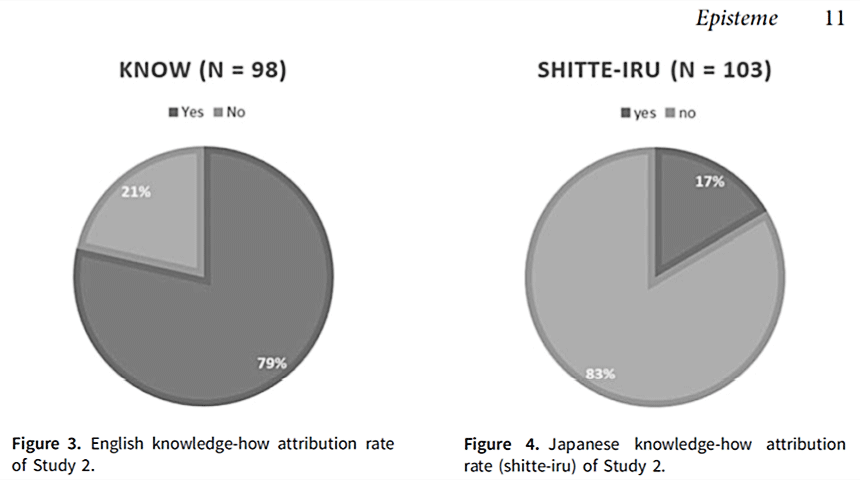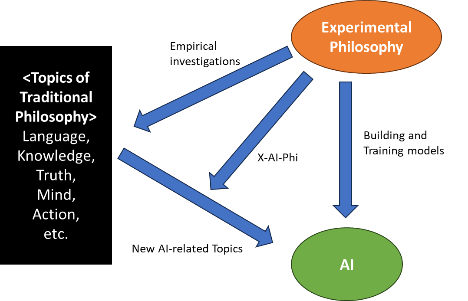
Language and Mind through AI & X-Phi
X-AI-Phi Laboratory
Associate Professor:MIZUMOTO Masaharu
E-mail:
[Research areas]
epistemology, philosophy of language, philosophy of mind and AI
[Keywords]
knowledge, mind, language, AI, Wittgenstein, culture, psychology,
Skills and background we are looking for in prospective students
One important condition is that you like thinking. Irrespective of the current major, you should have wide interests in many topics, like language, mathematics, consciousness, free will, ethics, etc. The ability to write either in English or in Japanese is also required.
What you can expect to learn in this laboratory
How to investigate what you’re really interested in with logical and scientific methods.
How to plan and design questionnaire research and how to analyze the data.
How language works in mind and its role in how the mind works, which also helps thinking about the nature of AI
【Job category of graduates】 Employment support consulting, traditional industries, staffing agencies, manufacturers
Research outline
This laboratory is based on “experimental philosophy,” which is an experimental and empirical approach to the study of philosophical problems, and we are investigating the relationship between language, mind, perception, ethics, and AI. If you really like philosophical inquiry, you can choose any topic, but it would be better if you were interested in the following issues in relation to my research.
1. AI, rules, meaning, language, computation, and the mind: Wittgenstein clarified many things about language and meaning through his examination of “following rules”, and this was also connected to his exploration of the foundations of mathematics. He questioned the meaning of “Church-Turing's Thesis” through his direct confrontation with Turing in his lectures, and this was also closely connected to Turing's later idea of the “Turing Test”. In recent years, interest in AI has been growing again, partly due to the emergence of LLM, but the essence of the question “Can machines think?” has not changed. If you would like to consider the essence of these issues, such as the difference between “simply appearing to think” and “truly” thinking, the “intentionality” that is important there, or “meaning,” and the normative nature that is essential to these, you are welcome to do so.
 2. Experimental philosophy: Since the 21st century, philosophers have been conducting experiments, and the traditional armchair philosophy that has been conducted in the minds of philosophers is now being judged with empirical data. As a result, various traditional topics such as moral dilemmas, free will, and personal identity, are being replaced by scientific inquiry through experimental philosophy. In addition, new philosophical topics such as the “Knobe effect” have emerged from experimental philosophy. What is particularly interesting is the cultural and linguistic differences in the basic concepts that are important in philosophy. For example, in Japanese, the translation of the English word 'know' is not only 'shitte-iru' but also 'wakatte-iru', and experimental philosophy has revealed that there are significant differences in the use and meaning of these two verbs. In addition, concepts behind the language we use in our daily lives, such as 'know how', truth predicates, and intention, are being revealed to have unexpected characteristics when examined. Comparative research into these concepts in other cultures and languages is still in its infancy, but it has great potential.
2. Experimental philosophy: Since the 21st century, philosophers have been conducting experiments, and the traditional armchair philosophy that has been conducted in the minds of philosophers is now being judged with empirical data. As a result, various traditional topics such as moral dilemmas, free will, and personal identity, are being replaced by scientific inquiry through experimental philosophy. In addition, new philosophical topics such as the “Knobe effect” have emerged from experimental philosophy. What is particularly interesting is the cultural and linguistic differences in the basic concepts that are important in philosophy. For example, in Japanese, the translation of the English word 'know' is not only 'shitte-iru' but also 'wakatte-iru', and experimental philosophy has revealed that there are significant differences in the use and meaning of these two verbs. In addition, concepts behind the language we use in our daily lives, such as 'know how', truth predicates, and intention, are being revealed to have unexpected characteristics when examined. Comparative research into these concepts in other cultures and languages is still in its infancy, but it has great potential.
 3. The Philosophy of AI: The rapid development of AI in recent years is also changing philosophy. Just as experimental philosophy has transformed traditional topics in philosophy into empirical inquiries, there is a movement to reexamine traditional topics such as epistemology, philosophy of mind, and philosophy of language from the perspective of AI. This also leads to capturing the changes in society brought about by AI technology at the conceptual level. We are about to witness a moment in human history when fundamental concepts such as “mind”, “knowledge” and “language” will change dramatically. Experimental philosophy is the only way to capture this conceptual change. Furthermore, philosophy is continuously generating problems that even AI cannot solve (because even humans cannot solve them), and it is thought that it will provide an important (final?) benchmark for AGI (general artificial intelligence) in the future, and the time is fast approaching when AI researchers and companies will start to tackle philosophy with a new sense of urgency as the final frontier. Traditional philosophy will also become increasingly valuable in the age of AI.
3. The Philosophy of AI: The rapid development of AI in recent years is also changing philosophy. Just as experimental philosophy has transformed traditional topics in philosophy into empirical inquiries, there is a movement to reexamine traditional topics such as epistemology, philosophy of mind, and philosophy of language from the perspective of AI. This also leads to capturing the changes in society brought about by AI technology at the conceptual level. We are about to witness a moment in human history when fundamental concepts such as “mind”, “knowledge” and “language” will change dramatically. Experimental philosophy is the only way to capture this conceptual change. Furthermore, philosophy is continuously generating problems that even AI cannot solve (because even humans cannot solve them), and it is thought that it will provide an important (final?) benchmark for AGI (general artificial intelligence) in the future, and the time is fast approaching when AI researchers and companies will start to tackle philosophy with a new sense of urgency as the final frontier. Traditional philosophy will also become increasingly valuable in the age of AI.
Based on the above fundamental issues of interest, in recent years, students in our laboratory have been working on issues such as
- choosing safety settings for self-driving cars and responsibility for accidents
- the introduction of AI in medical settings and issues of responsibility
- the causes of and attribution of responsibility for security incidents involving AI
using the method of experimental philosophy.
Key publications
- Mizumoto, M., Stephen Stich and Eric McCready (eds.) (2018). Epistemology for the Rest of the World. Oxford University Press.
- Mizumoto, M. (2018). A simple linguistic approach to the Knobe effect, or the Knobe effect without any vignette. Philosophical Studies 175, 1613–1630.
- Mizumoto, M., Shane Ryan and Chienkuo Mi (2025), “The Credit View and AI Testimony: A Cross-Cultural Epistemological Study of Human and AI Testimony” Artificial Intelligence and the Future of Human Relations: Eastern and Western Perspectives, Springer.
Equipment
Online questionnaire research platforms, software for statistical analysis, LLMs, etc.
Teaching policy
Students are expected to report the progress in their own research, at the laboratory seminar held every week.
[Website] URL : https://www.jaist.ac.jp/ks/labs/XAIPhiLab/index.html